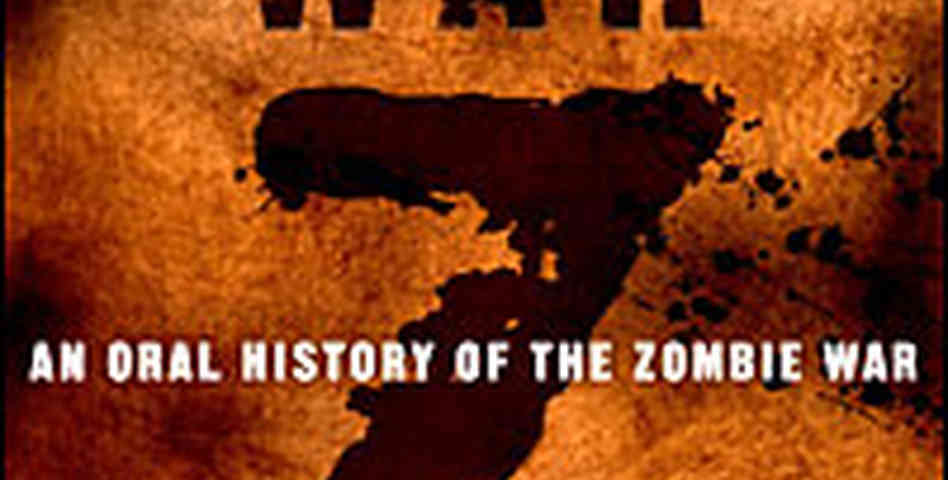“It goes by many names: ‘The Crisis,’ ‘The Dark Years,’ ‘The Walking Plague,’ as well as newer and more ‘hip’ Titles such as ‘World War Z’ or ‘Z War One.’ I personally dislike this last moniker as it implies an inevitable ‘Z War Two.’ For me, it will always be ‘The Zombie War.'” – Max Brooks, World War Z
Many people are sure that the zombie apocalypse is going to happen, especially Max Brooks, author of the “Zombie Survival Guide,” who also wrote “World War Z: An Oral History of the Zombie War.” In it, the narrator who works for the United Nation Postwar Commission (UNPC), submits the book as part of an even larger report detailing accounts and information about the war a decade after “Z-Day” was declared. Afterwards, the UNPC cuts out most of his stories from survivors along with the “emotional crap” to get only the cold hard facts—numbers and strategies for future generations. After arguing with his “boss” with the UNPC explaining how the human factor is the only true difference from us and “them,” Brooks’ boss goes on a tangent and yells at him saying “Who’s stopping you from keeping these stories alive in the pages of your own [expletive] book?”
“World War Z” is set up in a way that is different from most books. The book is separated into different sections, from “Warnings” and “The Great Panic” to “Home Front U.S.A.” and “Good-Byes.” In each section, there are stories from people who fought, ran, and survived the war. The stories are set up in an interview fashion, just like a newspaper, but to keep the focus on the interviewee, Brooks only puts in questions that the reader may also have, keeping his influence out of the tale.
Some memorable interviews involve more “normal” people in their fight to survive. One involves a teenager, Saladin, whose family was not expelled from Kuwait City when Arafat sided with Saddam. After watching news reports of Israel offering shelter to any Jew, foreigner of Israeli-born parents, and Palestinian family that once lived in Israel (which applied to Saladin’s family) from the new “African Rabies,” his family jumped on the opportunity and headed for Israel. The entire time Saladin expressed to his family that this was a Jew trap and that they would be killed if they went, and kept saying that, even to the moment that his family found themselves in a firefight. Wanting to join in the rebellion (or so he thought) he jumps into battle, but notices that there are Jews fighting other Jews and that people were being eaten. He then understood what was happening.
Another memorable story that hits closer to home involves a Japanese college student, who sits on his computer all day, browsing forums and playing internet games. Once the “Great Panic” started, he quickly used his internet skills to get as much information as he could about the new virus. But as quickly as he was getting info, the people who posted started leaving, dying, and being eaten alive. Eventually, after three weeks of staying in his apartment alone, the internet goes out. After the panic attack of losing his information and hearing moans and scratches at his door, he decides that he needs to leave. As he attempts to escape the apartment complex, he finds the weapon some dream of having in this situation—a katana.
The book is fantastic, but do not go see the new movie coming out expecting to avoid reading the book. While they do share the same title, the look and the plot are completely different. Instead of the interviews expressing the “human factor” of the war, the movie description goes like this: “Brad Pitt stars as Gerry Lane, a worker at the United Nations, as he searches the globe for information that can stop the zombie outbreak that is bringing down nations.” Who is Gerry Lane? The narrator’s name is never actually mentioned in the book, but to pick a strange name like that is strange. Second, in the trailer, it shows the zombies almost like a “28 Days Later” movie, and even with that, it is like a wave of bodies compared to a more realistic horde of multiple people. Finally, the movie’s focus is on Gerry trying to stop the zombie infection, which is implying that it is happening during the “Great Panic” or the war. The book has the narrator interviewing the people 10 years after the war is over, and even then we do not know what he did during the war.
“World War Z” is a great read for anyone, even for those who do not like the idea of zombies. It is sure to be a repeat read, as there are many details to catch on the second or third time through the book. Pick it up at any bookstore or online with Kindle or any tablet reading device.
Picture Courtesy of Three Rivers Press


'Book Review: WWZ – An Oral History of the Zombie War' has no comments
Be the first to comment this post!